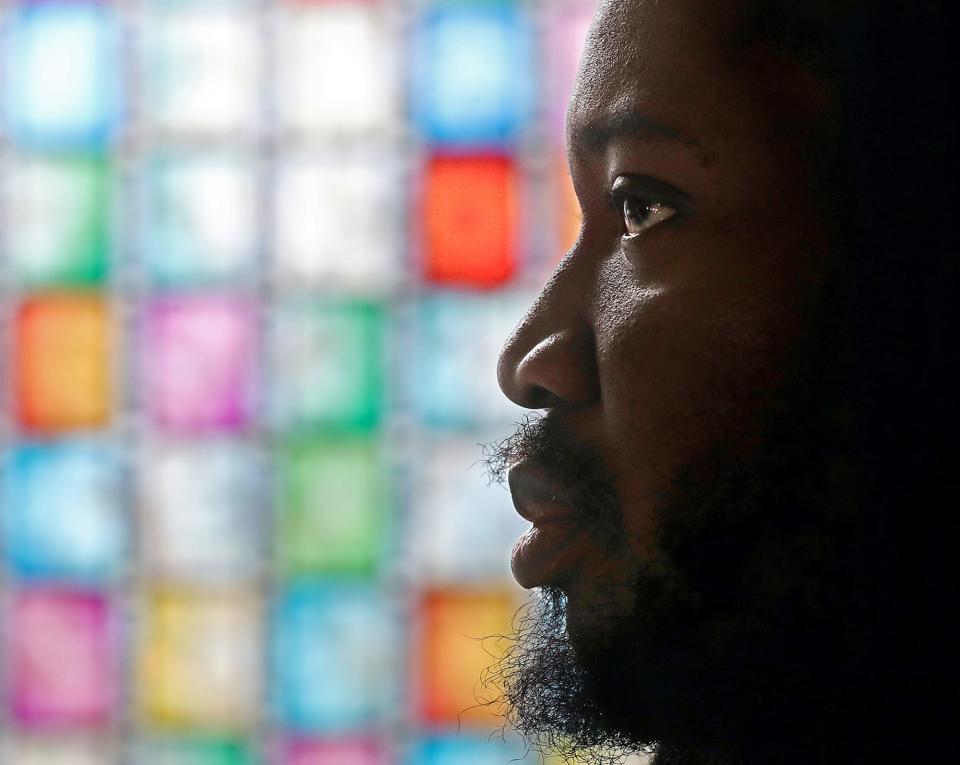'I just want to live my life': Trans youth, others condemn gender-affirming care bans

Jackson Stutler wants to be a trailblazer.
The 18-year-old incoming freshman at Kent State University is passionate about coding and wants to study game design and psychology in college with the goal of fulfilling his dream of becoming an in-house game design psychologist for video game companies, perhaps on the West Coast.
But the road to tapping into that inner-confidence, passion and drive wasn’t easy for the transgender teenager.
“I [was] a kid that was struggling with everything. … I was always inside my head and trying to distract myself from the world and everything else,” the Canton native told the Beacon Journal in an interview earlier this year.
“I wasn't out trying to actually learn until I transitioned.”
After a rigorous vetting process by medical professionals and with the support of his mother, Stutler began masculinizing hormone replacement therapy (HRT) at 16. In Stutler's case, his gender-affirming medical treatment involved administering testosterone to promote the physical changes that male hormones cause during puberty.
The changes were profound. Stutler was no longer suicidal. He went from earning Cs in his classes to becoming a straight-A student. He began to dress more confidently without the fear of being bullied. Because he now “passes” as his gender identity, Stutler is rarely misgendered in public. That has helped to alleviate a lot of his anxiety.
“It's great to be yourself. Because now I don't have to worry. … And I can focus on what I want to do,” he said.
Now, the gender-affirming care that has helped Stutler and so many other transgender youth in America is under attack by lawmakers in Ohio and in other Republican-controlled states.
Last fall, Reps. Gary Click, R-Vickery, and Diane Grendell, R-Chesterland, introduced House Bill 454, also known as the SAFE (Save Adolescents from Experimentation) Act. It aims to ban gender-affirming care, from HRT to puberty blockers, for people under the age of 18. If the bill becomes law, insurance companies and Medicaid will no longer cover gender-affirming care for young people and doctors will be penalized for providing it.
The bill also requires K-12 school workers to “out” or disclose a student’s gender identity to parents and guardians without that student’s knowledge or consent.
Ohio House Bill 454: Ohio Republicans want to ban treatments for transgender youth but what would that mean?
The first ban on gender-affirming care went into effect on May 8 in Alabama. A judge blocked part of the ban, but the law still requires educators to out students they assume are transgender to their legal guardians.
Supporters of the bill claim gender-affirming care causes irreversible damage to the health of minors and that minors are unable to give informed consent around this form of care.
But the Ohio bill, which saw its fourth House committee hearing on June 1, has been widely condemned by the medical community and civil rights groups, including the American Civil Liberties Union. Opponents say HB 454 violates the rights of trans youth and their families as they seek what numerous experts and peer-reviewed studies describe as a safe and critical form of medical care.
The American Academy of Pediatrics has characterized bills like HB 454 as “dangerous” and harmful to the physical and mental health of transgender youth.
Stutler believes the ban will create devastating outcomes for transgender teens like himself, who are already struggling with increased depression and anxiety and higher rates of suicide. LGBTQ+ youth are four times more likely to contemplate or die by suicide than their peers.
“I think personally that it will cause a lot of deaths,” Stutler said.
“I know if I wasn't affirmed, if I didn't have the treatment I did now and help and resources I had, I wouldn't be here. I wouldn't. I know I wouldn't be alive,” he added.
'A misguided effort'
In recent years, conservative lawmakers have focused on limiting young people’s access to gender-affirming care.

Jamie Keaton, a 29-year-old transgender and non-binary person from Akron, said HB 454 sends a dangerous message to trans youth.
'Strongly opposed': Akron LGBTQ+ community reacts to Ohio House Bill 616
"Essentially, what you're saying to them is, 'I don't care what you feel.' ... And then there's another aspect of this conversation, where ... they're pushing for the kid to go back into a closet that they've been fighting to bring themselves out of," said Keaton, who came out as non-binary at the age of 23 and began hormone replacement therapy years later. They credit the treatments with saving their mental health.
Keaton is concerned that HB 454 will not just harm all trans youth, but also exacerbate racial disparities in access to care and mental health of LGBTQ+ youth — particularly Black trans youth.
"Black trans people, we historically just haven't had the luxury of being advocated for as we should have been, for a long time. And the only time we really hear about Black trans people is when they're murdered," Keaton said, describing the challenges Black trans and gender nonconforming youth already face, in addition to accessing gender-affirming care.
In lieu of an interview, the Center for Gender Affirming Medicine at Akron Children’s Hospital provided a joint statement with the Ohio Children’s Hospital Association describing HB 454 as “a misguided effort that facilitates potential harm to a vulnerable population by denying them access to critical care and support.”
“We are opposed to any legislation that places professional discipline or civil penalties on clinicians who are providing support and clinical care based on the decisions made by the family and the patient care team, especially when following internationally recognized guidelines and standards of care. We are also opposed to any legislation that interferes with parental/guardian decision making for the care of their child. … [It] is critical Ohio not adopt laws that target a vulnerable population and restrict access to care,” the statement concluded.
The American Medical Association, the American Psychiatric Association, the American Academy of Child & Adolescent Psychiatry are among the major medical organizations that expressed opposition to HB 454.
Dr. Jack Turban, a child and adolescent psychiatrist at Stanford University School of Medicine, told the Beacon Journal he is concerned about the misinformation contained in bills like HB 454.
“It seems clear that those drafting these bills have not consulted with experts in the care of these patients. I worry about politicians without proper expertise passing these laws without understanding the relevant medicine and published research,” Turban wrote in an email.
HB 454 purports to ban gender reassignment surgery for youth. But advocates point out that such surgeries aren’t performed on people younger than 18.
“The emphasis is often placed on surgeries that just are not done on minors in the United States. A lot of the both legislative testimony given around bills and the wording of the bills themselves are devoted to surgeries that aren't performed on minors, and then use that as a cover to deny more standard forms of care for trans youth, like puberty blockers, that delay puberty to allow trans young people to make decisions about their medical care when they reach the age of 18,” said Ryan Thoreson, a researcher at Human Rights Watch who focuses on LGBTQ+ rights.
“So I think they tend to be a kind of Trojan horse where they use this very sensational terminology and a lot of kind of partial facts to then really restrict the health care that trans kids do receive and do need for their mental and physical health,” Thoreson said.
James Knapp, chair of TransOhio, said HB 454 violates the Affordable Care Act because it bans insurance companies from covering necessary care for transgender youth and forbids Medicare and Medicaid funds to be used for transitional care costs.
"We already have case law saying that that's unlawful," Knapp said.
“That's a violation, not just of law, but of bodily autonomy," he continued, drawing a connection between gender-affirming care bans and abortion bans.
"Besides anti-abortion laws — I could compare those two — there are no other laws like this that forbid medical treatment based on a person's identity. … So you wouldn't be able to go to the doctor and receive treatments, despite what the doctor would like to treat you. ... We're really violating doctor-patient relationship here," Knapp said.
"To have state legislatures interfering" with the doctor-patient relationship, Thoreson said, "sets a precedent that everyone should be worried about — and not only trans kids."
'Why make them go through 20 years of suffering?'
Reflecting on how puberty blockers saved her own son's life, Jackson Stutler's mother, Melissa Stutler, emphasized that the treatments are safe and allow trans youth and their families to take their care into their own hands.
"Why make them go through 20 years of suffering?" she asked.
She pointed out that puberty blockers delay secondary sex characteristics — such as enlarged breasts or Adam's apples — from developing until a minor decides to continue their transition.
Once secondary sex characteristics develop, transitioning becomes more complicated and costly — and any gender dysphoria experienced by the transgender child becomes more acute, resulting in deteriorating mental health, experts say.
"A lot of the kids that aren't going to get the support ... they're either gonna get suicidal, or the hell they will go through trying to get there on their own after their body has matured. It's sad," Melissa Stutler said.
"I just think it's horrendous as a society... to make that decision for a minority and know nothing about it," she said.
Gio Santiago, Northeast Ohio organizer for Equality Ohio, urged LGBTQ+ allies to communicate to lawmakers their concerns around the harms of HB 454 and to donate to organizations working to fight for trans rights.
“They're not listening to trans people. They need to listen to people that look like them,” Santiago said of the importance of non-trans people showing solidarity and appealing to lawmakers.
Jackson Stutler questioned why people would want to interfere in others' bodily autonomy.
"When you see these people after their transition and how happy they are — but you saw how miserable they were before and how you feel — you want to go through that, so you can make it out on the other side and live the best you. You want to live the life that you're supposed to live, how you know you're supposed to live. [But] there's all these people, like, 'No. No, you're not allowed. You have to stay exactly where you are. And you're gonna have to struggle, until whenever we decide we want to let it happen'," he said.
"I just want to live my life. I want to have the same rights as everybody else. ... I don't want somebody to keep stopping me from getting the help I need."
Seyma Bayram is a corps member with Report for America, a national service program that places journalists into local newsrooms. Learn more at reportforamerica.org. Contact her at sbayram@thebeaconjournal.com or 330-996-3327 or on Twitter @SeymaBayram0.
This article originally appeared on Akron Beacon Journal: Transgender youth oppose Ohio bill to ban gender-affirming care

